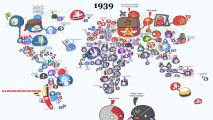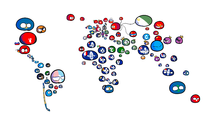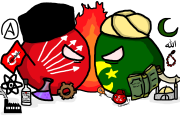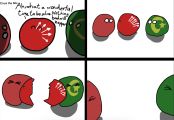imported>YugoslavPartisan (Adding categories) |
imported>YugoslavPartisan (Adding categories) |
||
| Line 263: | Line 263: | ||
[[pl:Kemalizm]] | [[pl:Kemalizm]] | ||
[[Category:Democratic]] | [[Category:Democratic]] | ||
[[Category:Liberals]] | |||
Revision as of 21:25, 15 July 2021
Kemalism, also called Ataturkism, is a left-wing, nationalist, secular and culturally rather progressive ideology inhabiting a moderate position in the authoritarian left quadrant. and is the ideology of Mustafa Kemal Atatürk. It essentially advocates for a progressive, nationalist social democracy and can be seen as a more moderate version of ![]() Left-Wing Nationalism, especially on the economic axis. It has a strong cult of personality in Turkey since its foundation.
Left-Wing Nationalism, especially on the economic axis. It has a strong cult of personality in Turkey since its foundation.
The six arrows of Kemalism represent ![]() Republicanism,
Republicanism, ![]() Populism,
Populism, ![]() Nationalism,
Nationalism, ![]() Laicism (exclusion of ecclesiastical control and influence),
Laicism (exclusion of ecclesiastical control and influence), ![]() Statism and
Statism and ![]() Reformism.
Reformism.
History
Kemalism is the ideology of Mustafa Kemal Atatürk and the founding ideology of the Republic of Turkey. The ideology was designed to help modernize Turkey and separate it from its Ottoman predecessor, these reforms include democracy, secularism, state support of the sciences and free education.
The early roots of the ideology began during the early 19th-century Tanzimant reforms in the late years of the Ottoman Empire when the Empire was trying to stop its collapse, of course this merely delayed the inevitable. After the Young Ottoman movement ditched Ottoman Nationalism (![]() Ottomanism) to stop the rising ethnic nationalism within the Empire in favour of Turkish nationalism becoming the Young Turks (no, not the American news tabloid) which sought to establish many things the Young Ottomans wanted established like a democracy however unlike the Young Ottomans, the Young Turks were in favour of secularism. The Young Turks inspired Atatürk greatly with their advocacy of democracy, Turkish nationalism and secularism among other things. After the collapse of the Ottoman Empire and the subsequent establishment of the Republic of Turkey in 1923, Atatürk implemented these ideas as well as bringing about more economically left reforms to the nation which the nation had never experienced before.
Ottomanism) to stop the rising ethnic nationalism within the Empire in favour of Turkish nationalism becoming the Young Turks (no, not the American news tabloid) which sought to establish many things the Young Ottomans wanted established like a democracy however unlike the Young Ottomans, the Young Turks were in favour of secularism. The Young Turks inspired Atatürk greatly with their advocacy of democracy, Turkish nationalism and secularism among other things. After the collapse of the Ottoman Empire and the subsequent establishment of the Republic of Turkey in 1923, Atatürk implemented these ideas as well as bringing about more economically left reforms to the nation which the nation had never experienced before.
Beliefs
Kemalism is defined by having six principles, which are notably represented in its symbol with the six arrows.
 Republicanism
Republicanism
Republicanism or in Turkish "cumhuriyetçilik" is the belief that civic power within society should be held within ![]() democratically elected representatives, instead of passed down through the generations like in a
democratically elected representatives, instead of passed down through the generations like in a ![]() monarchy of the Ottoman Empire. Though it also banned earlier opposition parties because of "saving the secular state"
monarchy of the Ottoman Empire. Though it also banned earlier opposition parties because of "saving the secular state"
The Kemalist republic is a unitary state favoring centralization.
 Nationalism
Nationalism
Nationalism or in Turkish "Milliyetçilik" in the Kemalist context refers to the belief in a single Turkish nation unified under a ![]() Rousseauian social contract. This form of Nationalism is very much
Rousseauian social contract. This form of Nationalism is very much ![]() Civic, believing that to be Turkish one must "Protect and promote the moral, spiritual, cultural and humanistic values of the Turkish Nation.". Kemalist Nationalism also favors a form of Souverainism, rejecting
Civic, believing that to be Turkish one must "Protect and promote the moral, spiritual, cultural and humanistic values of the Turkish Nation.". Kemalist Nationalism also favors a form of Souverainism, rejecting ![]() imperialism and foreign conquest, although it views the nation as inseparable not allowing for secessionism.
imperialism and foreign conquest, although it views the nation as inseparable not allowing for secessionism.
 Populism
Populism
Populism or in Turkish "Halkçılık" is the belief that political power and sovereignty within society should be held by the Turkish people instead of a nobility.
However, the concept of "people" here is not in a left-wing or right-wing "populist" sense. It is ideologized by "solidarist ![]() corporatism" (or corporate solidarism) originating from the Third French Republic. Kemalist intellectuals significantly influenced by Émile Durkheim. Kemalism, against the class struggle and supports the cooperation of the professions. However, there were no corporations established in Kemalist Turkey. The Republican Peoples Party program is theoretically divided "people" into professions. The aim here is to create a united nation that does not discriminate "class, race, religion and gender".
corporatism" (or corporate solidarism) originating from the Third French Republic. Kemalist intellectuals significantly influenced by Émile Durkheim. Kemalism, against the class struggle and supports the cooperation of the professions. However, there were no corporations established in Kemalist Turkey. The Republican Peoples Party program is theoretically divided "people" into professions. The aim here is to create a united nation that does not discriminate "class, race, religion and gender".
Because of this similarity, the Republican People's Party was invited by the Radical Republican Party to the International Understanding of Radical Parties and Similar Democratic Parties (Entente Internationale des Partis Radicaux et des Partis Démocratiques Similaires) in 1926.
Şükrü Kaya, Atatürk's Minister of Interior, stated the following in the official newspaper dated February 13, 1937:
Friends; There are various kinds of organizations called populism on earth. Joint work of leftist ideas in recent timesand called the popular fronts, a number of political we meet the institutions. Our notion of populism has nothing to do with them. The truth of this word is to the party in the first days of the was taken as the name. The populism recipe, which was made in the language of the Great Chef (Mustafa Kemal Atatürk), found its perfection in the party program. This qualification protects dormitory is from pretenses of privilige and class fights. It has great importance protecting.
In the 1931 Republican People's Party (CHP) Program, it was written as follows:
It is one of our main principles to accept the people of the Republic of Turkey as a community that is not made up of separate classes, but as a community that is dedicated to various employees in terms of division of labor for individual and social life.
A) Small farmers,
B) Small industrialist and shopkeepers,
C) Workers
D) Self-employed person,
E) Industrialists, large land and business owners, and merchants.
They are the main working groups that constitute the Turkish community. The work of each of them is essential for the life and happiness of the other and the general community. The purpose of our party with this principle is to ensure social order and solidarity instead of class struggle and to establish harmony in interests in a way that does not distort each other. Benefits are proportional to ability and degree of work.
The aim is "to build a cohesive mass without privileges, without classes."
However, a compromise between workers and bosses is stipulated. For this reason, good rights have been provided to the workers and job security to the bosses. Thus, the class struggle was wanted to be prevented. However, Kemalism is not fascism. It does not have a fascist corporatist understanding. His understanding is a solidarist corporatist.
Strikes and lockouts are prohibited. The aim is to create a unified nation. Workers and bosses are required to be "civic nationalists". In the program of the Republican People's Party of 1931, it is stated as follows:
"We will take into account the rights and interests of nationalist Turkish workers. Establishing harmony between labor and capital, and imposing appropriate provisions with a labor law, are among important jobs."
Within the scope of this principle (Kemalist populism), "Spring Day" was celebrated as a national holiday instead of May 1, Labor Day since 1935. May 1 is a holiday. However, instead of a holiday representing the working class, it was declared a national holiday.
 Statism
Statism
Statism or in Turkish "devletçilik" is the belief that the state should actively intervene within the economy and society to solve issues, this principle aligns Kemalist economic policy as leaning towards ![]() Social Democracy favouring a large welfare state.
Social Democracy favouring a large welfare state.
The economic side of the principle was expressed by Atatürk as "dirigisme" and "state socialism". It is a pragmatic principle. Because economic understandings change over time.
In the opening speech of Atatürk's CHP 4th Congress (May 9, 1935) , he said:
Friends you see that; We are dealing with establishing a brand new guided economy (dirigisme, dirigiste) order. Our party's economic understanding; It will show that our program in this direction is the best program that will meet the needs of the country and make it develop in a short time. There is no doubt that with your new advice and directives you will facilitate our re-advancement and promotion measures.
On 1 November 1937, Atatürk said:
Markets are not intervened unless there is a definite obligation; however, no market is idle either.
Celal Bayar, who was the prime minister while Atatürk was alive, said in his speech on 8 November 1937:
If today's world conjuncture changes, or if any country offers us a form that will meet our original purpose, or if the benefits of our national trade allow, we will not hesitate to switch to another form (another economic model). In this way, it seems that we will always preserve the flexibility of adaptation pointed out by the Chief (Atatürk). In summary, our policy is a guided economy (dirigiste, dirigisme) policy that constantly adapts to time and needs. This road will be walked carefully.
 Laicism
Laicism
Laicism, also called secularism and in Turkish "Laiklik" is the belief that religion should be separated from all forms of public life. What separates Kemalist laicism from how secularism is practiced in most western countries is the focus on not only separating the church (or rather mosque) from the state, but also from society in general, seeking to make religion a personal affair. This principle aligns Kemalist social policy as being culturally rather left-wing.
 Reformism
Reformism
Reformism, also called Revolutionism and in Turkish "inkılâpçılık" is the belief that the Turkish Society and the Kemalist philosophy should seek to actively reinvent and modernize to fit with the modern times and not to cling on the oppressive institutions of the past. This principle aligns also aligns Kemalist social policy as being culturally rather left-wing
Variants
 Liberal Kemalism
Liberal Kemalism 
The Free Republican Party (sometimes referred to as the Liberal Republican Party; in Turkish: Serbest Cumhuriyet Fırkası) was a political party founded by Fethi Okyar upon President Kemal Atatürk's request in the early years of the Turkish Republic.
Mustafa Kemal Atatürk requested that Okyar create it as an opposition party to confront the ruling Republican People's Party with the aim of establishing the tradition of multi-party democracy in Turkey.
In addition, this party defended the Liberal Kemalist thought in line with Atatürk's wishes.
However, the party was quickly embraced by the conservatives who saw it as an opportunity to reverse the reforms of Atatürk, particularly regarding secularism, and was personally dissolved in November 1930 by Okyar who himself was an ardent supporter of the reforms.
 Socialist Kemalism
Socialist Kemalism 
In line with Atatürk's request and permission, the communists on trial in 1927 published a new magazine. The name of the magazine was "Kadro". Atatürk also made a statement to this magazine. However, the publishers of the magazine made a socialist-Kemalist discourse, not being a Marxist due to their ideological orientation. Ultimately, the magazine's lead author was appointed ambassador. For this reason, Kadro magazine dissolved itself. In short, they were "socialist-Kemalist".
Those who publish the magazine are called "Kadroists (Kadrocular)."
 Social Democratic Kemalism / Centre-Left Kemalism
Social Democratic Kemalism / Centre-Left Kemalism 
The Republican People's Party declared that it was the Left of Center (Turkish: Ortanın Solu) since 1965. After this year, Kemalism and social democracy were commemorated together in Turkey. Before 1965, there was no social democracy in the Republican People's Party.
Bülent Ecevit and İsmet İnönü are the founders of this ideology.
On July 29, 1965, just before the 1965 general elections, Chairman İsmet İnönü spoke for the first time that the CHP's line was "left of center" during an interview with journalist Abdi İpekçi:
- The CHP is a statist party by nature, and as such, of course, it has a left-of-centre understanding.
Bülent Ecevit, on the other hand, says in his book "Left of Center":
- The main factor that separates the center-left from the extreme left, communism, is that it is democratic. (p. 91)
Ecevit later founded the Democratic Left Party. Here he continued to defend his view with names such as "democratic left".
 Right-wing Kemalism / Centre-right Kemalism
Right-wing Kemalism / Centre-right Kemalism 
It can be assumed that the Democrat Party, which came to power in 1950, established this ideology. Celal Bayar, who was with Atatürk until his death (1938), implemented it (he was elected the 3rd president of Turkey in 1950 after İsmet İnönü). During this period, relations with America and NATO are at a high level. Anti-communism is more radical than Ataturk era. Turhan Feyzioğlu, who later opposed the concept of "left of centre", left the Republican People's Party and founded the Republican Reliance Party on the principles of right-Kemalism.
The concept is controversial.
 Fascist Kemalism
Fascist Kemalism 
With the influence of the rising Fascism in the world in the 1930's (although not certain), Recep Peker argued that the Republican People's Party should go to a Fascism type organization. Paramilitary units affiliated with the party demanded applications such as strong party anthems and fascist council. However, Peker rejected Fascism ![]() and Corporatism
and Corporatism ![]() in his speeches, but it is known that he had a kind of Fascist-Kemalist mentality. His ideas were rejected by Atatürk.
in his speeches, but it is known that he had a kind of Fascist-Kemalist mentality. His ideas were rejected by Atatürk.
How to Draw
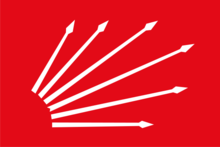
Kemalism's design is based of the "Six Arrows" symbol, which represents the six principles of the ideology. The symbol is used by the Government of Turkey and the Republican People's Party of Turkey.
- Draw a ball with eyes.
- Fill it with red.
- Draw 6 white arrows coming from the bottom left corner.
And you're done!
| Color Name | HEX | RGB | |
|---|---|---|---|
| Red | #E30A17 | 227, 10, 23 | |
| White | #FFFFFF | 255, 255, 255 | |
Relations
Friends
 Longism - A bit too religious but he's cool otherwise.
Longism - A bit too religious but he's cool otherwise. Social Democracy - Best economic system.
Social Democracy - Best economic system. Left-Wing Nationalism - Turkey stronk.
Left-Wing Nationalism - Turkey stronk. Civic Nationalism - Together against ethnats and racenats.
Civic Nationalism - Together against ethnats and racenats. Tridemism
Tridemism  - Fellow Modernist.
- Fellow Modernist. Social Authoritarianism - The state must secure the well-being of the people!
Social Authoritarianism - The state must secure the well-being of the people! Laicism - Religion and state MUST be separate!
Laicism - Religion and state MUST be separate! Republicanism - Long live the republic!
Republicanism - Long live the republic! Reformism - I shall transform Turkey towards a modern state.
Reformism - I shall transform Turkey towards a modern state. Radicalism - I like your French version and your "laicist, civic nationalist, republicanist, democratic, progressive" ideas. But i can't enter "Entente Internationale des Partis Radicaux et des Partis Démocratiques Similaires." Sorry brother.
Radicalism - I like your French version and your "laicist, civic nationalist, republicanist, democratic, progressive" ideas. But i can't enter "Entente Internationale des Partis Radicaux et des Partis Démocratiques Similaires." Sorry brother. Protectionism - The best way to form the Turkish "national bourgeoisie".
Protectionism - The best way to form the Turkish "national bourgeoisie".
Frenemies
 Paternalistic Conservatism - Good economics and nationalism, bad social policies.
Paternalistic Conservatism - Good economics and nationalism, bad social policies. Islamic Feminism - Women's rights are very important, but what do you mean you actually want to wear a veil voluntarily ?!
Islamic Feminism - Women's rights are very important, but what do you mean you actually want to wear a veil voluntarily ?! Leninism - Thanks for helping me in the Turkish war of independence. Although Communism isn't great.
Leninism - Thanks for helping me in the Turkish war of independence. Although Communism isn't great. Pancasila - He is pretty close to me and
Pancasila - He is pretty close to me and  Tridemism. But I don't like how religious he is.
Tridemism. But I don't like how religious he is. Welfare Chauvinism - I like your economic policies, but
Welfare Chauvinism - I like your economic policies, but  Ultranationalism is stupid.
Ultranationalism is stupid.  Civic Nationalism is the best type of Nationalism!
Civic Nationalism is the best type of Nationalism! Venizelism - I know you're annoyed about the whole Izmir incident, but we're cool now, right?
Venizelism - I know you're annoyed about the whole Izmir incident, but we're cool now, right? Metaxism - Right?
Metaxism - Right? Corporatism - It's nice to maintain social justice and be against class conflict. I also classified my people according to their professions. But corporations and trade unions are not good.
Corporatism - It's nice to maintain social justice and be against class conflict. I also classified my people according to their professions. But corporations and trade unions are not good. Islamic Democracy - ......have you realized how much a tool you are?
Islamic Democracy - ......have you realized how much a tool you are? İttihadism - I remember the days when we were friends. Good days. But why did you have to become so... well... fascist after 1913?
İttihadism - I remember the days when we were friends. Good days. But why did you have to become so... well... fascist after 1913? Liberalism - I had Fethi Okyar establish the Liberal Republican Party, but I need statism.
Liberalism - I had Fethi Okyar establish the Liberal Republican Party, but I need statism.
Enemies
 Islamic Theocracy - No.
Islamic Theocracy - No. Neo-Ottomanism - LOOK HOW HE MASSACRED MY BOY!
Neo-Ottomanism - LOOK HOW HE MASSACRED MY BOY! Ultranationalism - You are the biggest ally of
Ultranationalism - You are the biggest ally of  Neo-Ottomanism. Fuck you!
Neo-Ottomanism. Fuck you! Jihadism - Fuck off, Islamic terrorist!
Jihadism - Fuck off, Islamic terrorist! Islamic Fascism - Even worse than the last four.
Islamic Fascism - Even worse than the last four. Islamic Populism - Stop trying to bring these backwards idiots into power, dammit!
Islamic Populism - Stop trying to bring these backwards idiots into power, dammit! Imperialism - SHOO BRI'ISH!
Imperialism - SHOO BRI'ISH! Anationalism - BAS....wait, I thought you were called Anatolianism for a second. Nevermind, you suck.
Anationalism - BAS....wait, I thought you were called Anatolianism for a second. Nevermind, you suck. National Socialism - I don't care you admired me, you are a genocidal scum!
National Socialism - I don't care you admired me, you are a genocidal scum! Democratic Confederalism - There is a problem with Kurdishness in Turkey
Democratic Confederalism - There is a problem with Kurdishness in Turkey Kaypakkayaism - QUIT CALLING ME A FASCIST!
Kaypakkayaism - QUIT CALLING ME A FASCIST! Fascism - STOP THINKING ABOUT INVADING MY COUNTRY, IMPERIALIST SHIT!
Fascism - STOP THINKING ABOUT INVADING MY COUNTRY, IMPERIALIST SHIT!
Further Information
Literature
- Nutuk by Ataturk
- Ataturk: The Biography of the Founder of Modern Turkey by Andrew Mango
- Turkish Foreign Policy: Islam, Nationalism and Globalization by Hasan Kosebalaban
- Ataturk: An Intellectual Biography by Sukru Hanioglu
- CHP's Relations with Europe's Radical and Democratic Parties (1926-1935) by Hakkı Uyar
Wikipedia
- Mustafa Kemal Atatürk
- Kemalism
- Republican People's Party
- Ataturk's Cult of Personality
- Ataturk's Reforms
- Left of Center
- Liberal Republican Party
- Liberal Kemalism in Polcompball Turkish
Videos
Online Communities
Gallery
-
Credit: u/duy_physics, Source
-
Credit: OzymndiasFR
-
Credit: bruno-radical, Source
-
Shame
-
kemalism vs islamic theocracy
-
Rough day for kemalism
 | |
| {{{name}}} | |
|---|---|
| Societal Information | |
| Historical Information | |
| [Source] |
